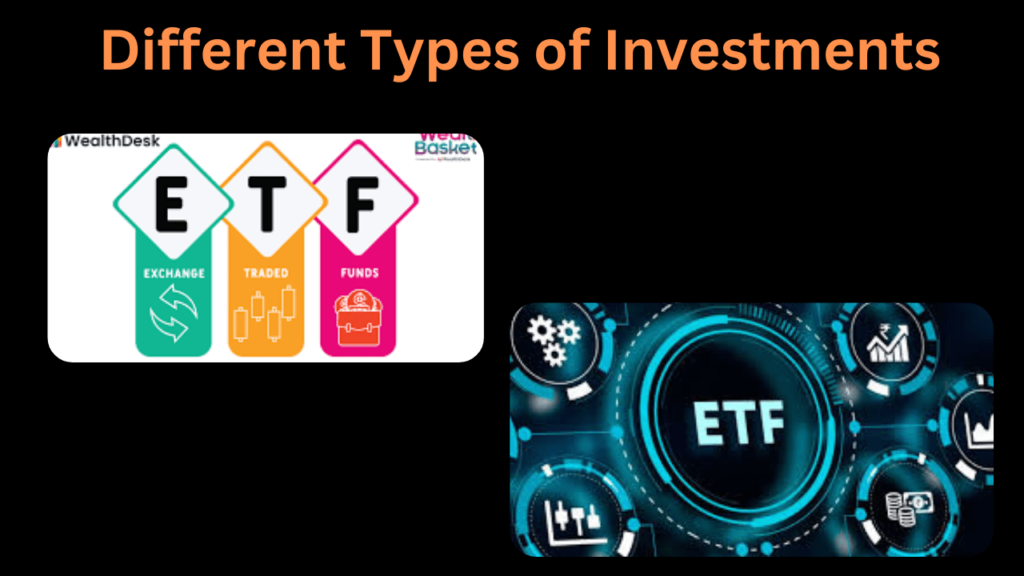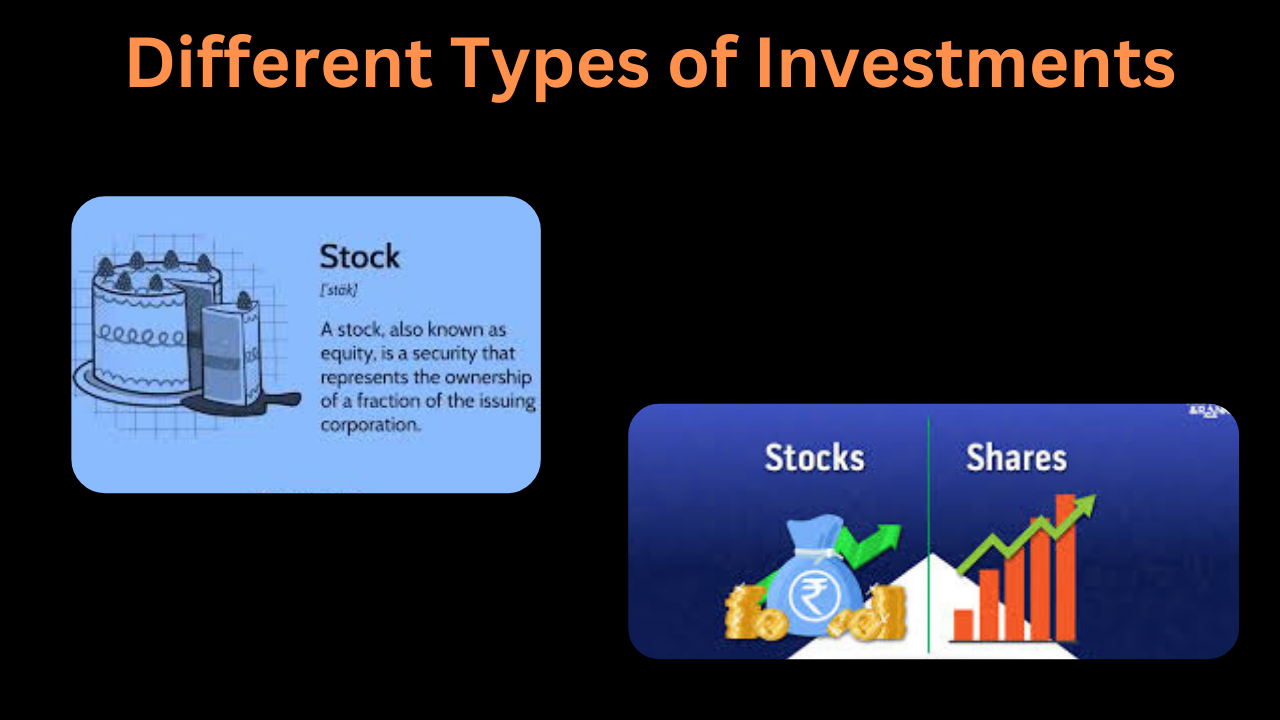different types of investments are very important for any financial growth and stability. One must have the knowledge about different types of investments to make wise decisions that match one’s financial objectives and risk levels. This guide seeks to provide a complete survey on various investment types, describing their features, advantages and possible disadvantages.
Table of Contents
different types of investments
1) Shares
Definition: Stocks also known as equities represent ownership in a company; they are bought by those who purchase them so that they become its partial owners.
Advantages:
Highly Profitable: Stocks may achieve significant returns in the course of time.
Dividend Payments: Some stocks pay dividends thus offering regular income source.
Liquidity: They are relatively liquid can be easily sold or bought.
Disadvantages:
Volatility: Stock prices tend to highly changeable.
Risk: If a firm does not do well, you can lose your entire investment.
Suitable For: Long-term investors with higher risk tolerance levels
2)Bonds

Definition: A bond is a debt security issued by companies or governments or municipalities. When you buy bonds, you lend money to the issuer in return for periodic interest payments and repayment of principal at maturity.
Advantages:
Steady Cashflow: Bonds give out interest regularly.
Low Risk Levels : They are generally less volatile compared to company shares .
Diversity : Can be used to diversify an investment portfolio .
Disadvantages:
Less Returns .Bonds usually bring lower returns than stocks do.
Interest Rate Exposure – Bond prices may drop if rates rise up..
Suitable For : Income-oriented conservative investors bearing limited risks
3)Mutual Funds
Definition: Mutual funds pool together cash from multiple buyers which is then used to purchase various stocks, bonds or other securities. These funds are managed by professionals called fund managers who manage them on behalf of the shareholders (investors).
Advantages:
Spread Risks Across Various Securities: This can be achieved by investing in a number of different assets.
Professional Management: Managed by experienced professionals.
Accessibility: Easy to buy and sell through fund companies or brokers.
Disadvantages:
Expenses .Management and administrative fees can reduce investment returns.
Investor Powerlessness .They have no control over the investment decisions made for the funds..
Suitable For: People who want to diversify their portfolios in a passive way while benefitting from professional management
4)Exchange Traded Funds (ETFs)

Definition: Exchange traded funds are like mutual funds, but they trade on exchanges just like shares on stock markets. They try to match the performance of specific indices or sectors.
Advantages:
Diverse Market Access – Enable investors to get exposure into various markets/sectors
Tradeability – They can be bought and sold during trading hours each day
Lower Cost – Generally lower expense ratios than those of mutual funds
Disadvantages:
Commission Charges – Frequent trades may incur brokerage fees .
Market Fluctuations – Dependent on market price changes .
Suitable For : Investors who seek cost effective diversification with convenient exit options
5)Real Estate Investments

Definition: Real estate investments refer to the purchase of properties that are either meant for income generation as rentals or appreciation as land prices go up. This could involve residential, commercial, or industrial buildings.
Advantages:
Constant Cash Flowing : Rental income constitutes constant cash flows received from these properties..
Return On Investment : Property values tend to rise over time henceforth creating appreciation.
A Physical Asset: It is an asset you can touch that can be used to secure loans..
Disadvantages:
Lack of easy liquidity as real property cannot be easily disposed off fast enough compared to other investments such as stocks and bonds which are capital market instruments since they have secondary market/stock exchange where one can sell them instantly..
Higher Initial Costs .Significant upfront investment required.
Management .This is because properties require maintenance and management on a continuous basis..
Suitable For: Investors looking for growth and income in the long-run with a readiness to manage property.
6)Commodities
Definition: Commodities are raw materials such as gold, silver, oil, and foodstuffs. Investors can invest in commodities by buying futures contracts or by purchasing ETFs or they can take physical ownership of them.
Advantages:
These investments tend to perform well during inflationary periods since they serve as an inflation hedge.
Diversification: The diversification of portfolios.
Drawbacks:
Volatility: Commodity prices can be extremely volatile.
Storage Costs: Physical commodities incur costs such as storage and insurance fee.
Suitable For :Investors looking for diversification and protection against inflation.
7)Cryptocurrencies

Definition: Cryptocurrencies refers to digital or virtual money that relies on cryptography for security purposes and the most prominent examples are Bitcoin and Ethereum.
Benefits:
High Return Potential: Prices of cryptocurrencies may increase significantly.
Decentralization: Not being under any governing body’s control.
Innovation: Prospects in nascent blockchain technology.
Drawbacks:
Extreme Volatility: Prices can fluctuate widely on the market.
Regulatory Risk: Uncertainty about future regulations
Suitable For :Investors with a high risk tolerance and interest in emerging technologies .
8)Certificates of Deposit (CDs)
Definition : Time deposits provided by banks with fixed interest rates and maturity dates are called CDs .
Benefits:
Safety : Low risk investments insured by FDIC up to certain limits
Fixed Returns : Can provide steady income stream
Drawbacks:
Lower Returns : Usually offer smaller returns compared to other investments
Limited Liquidity : Funds are frozen until maturity date
Suitable For : Risk-averse investors seeking guaranteed returns
Conclusion
To develop a well-diversified portfolio that aligns with your financial goals and risk tolerance, one must understand different types of investments. Every investment type has its own peculiarities, advantages and downsides. Diversifying your investments helps you manage risks better while increasing chances of higher returns. Always consider your finances, how long you want to remain invested, along with your attitude towards taking risks before making investment decisions . It is also possible to get personalized advice on what is best for you from a financial adviser who knows your needs well.







